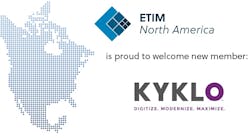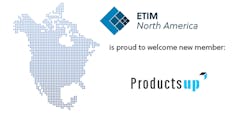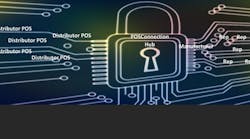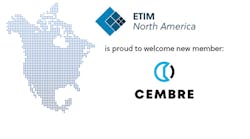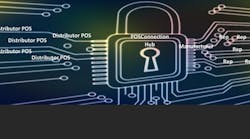Supporters of IDEA hope a report documenting the significant cost savings achieved by four electrical distributors and three manufacturers will convince more companies to sign on.
“A Valuable Idea,” a white paper written for the Industry Data Exchange Association (IDEA), Rosslyn, Va., by Neil Gillespie, principal, Channel Marketing Group, Pittsburgh, and Allen Ray, president, Allen Ray Associates Ltd., Arlington, Texas, highlights the savings these large manufacturers (each with electrical channel sales of more than $1 billion) and electrical distributors now enjoy through IDEA. The white paper is intended to offer rock-solid evidence that IDEA's solutions can help distributors and manufacturers enhance profitability, data accuracy and transaction efficiency by transmitting data through the IDX2 value-added network (VAN), managing data through the IDW2 industry data warehouse (IDW), and synchronizing and cleansing data through the Data Audit and Certification (DAC) process.
“The potential gains made public with this report should convince anyone in the industry to re-evaluate their current data content and network service providers,” says Mike Rioux, IDEA's president. An IDEA press release on the white paper said if distributors and manufacturers utilize electronic receiving, invoice automation, and electronic special price authorization (SPA) pricing and claims, they can eliminate human error and generate benefits of 0.25 percent to 2 percent of additional profit as a percentage of sales.
Although IDEA has been promoting the benefits of clean, synchronized data and the efficiencies of using the IDW as a centralized depot of product and pricing information since its inception in 1999, it has always battled apathy, concern over costs and a misunderstanding over the benefits of its services. The primary reasons many distributors and manufacturers haven't signed on with IDEA could be summarized as:
-
I don't think my company has problems with inaccurate pricing and data.
-
I don't know about the potential of IDEA's e-business tools.
-
I know what IDEA offers, but I don't want to spend the money.
-
I am not interested in IDEA because I don't care about e-business.
Gillespie jokingly says, “They put it in this category in their brain called ‘other.’ That's that messy IT process management kind of stuff. They say, ‘I think I will run over to sales and marketing and do some of that instead.’”
He said the study's findings revealed “a total lack of a ‘big-picture view’ of how you should look at e-business and productivity, in terms of metrics.”
“Allen and I found one electrical manufacturer who focused on special pricing authorizations (SPAs) and had metrics measuring their errors there,” he said. “But in terms of measuring errors on invoices, where distributors would deduct what they perceived was an error made by the manufacturer, they had no metrics whatsoever. No one took an end-to-end view of the process.”
Gillespie added that electrical distributors are leaving lots of money on the table by not implementing EDI in their businesses. “If they haven't done anything in the way of automating orders, invoices, and/or SPA claims or SPA price notifications, they can add up to 2 percentage points of profit to the bottom line,” he says. “Most manufacturers have already automated receipt of orders from distributors. That's the low-hanging fruit. I can't say that for the distributor community. A lot of them are doing just what they have to.”
Some distributors may be reluctant to embrace e-business because of their companies operating styles. Allen Ray says one large Southwestern distributor with a decentralized operating philosophy submits orders and gets billed from manufacturers via EDI, but manually pays all invoices. “Most distributors stop at doing EDI orders,” says Ray. “The real goldmine is in processing invoicing and SPAs.”
Ray says the IDEA study also highlights additional benefits in back-office integration for distributors.
The report also emphasizes the benefits of data synchronization. “Synchronize your data” has long been a mantra in the e-business community because it's at the foundation of all electronic business communications. In describing the need for synchronized data, the report said, “If you fuel a Ferrari with contaminated gasoline, you will still experience poor engine performance despite the superior engine. Similarly, if you use EDI or similar electronic documents such as inbound EDI 810 invoices as a distributor and have not synchronized your product database with a particular manufacturer, you could actually create more work than previously experienced, because your business systems will catch all line items that do not match without exception.”
Larger electrical distributors get the most cost savings from IDEA's services because they have the most employees dedicated to time-intensive processes such as accounts payable and reconciling SPAs. Gillespie says one $90-million electrical distributor only needs two employees handling accounts payable and SPA claims when they have automated those processes through IDEA. In contrast, a distributor of this size that manually handles these processes will often dedicate six to eight employees to these tasks.
For larger companies, savings are even more dramatic. A large distributor profiled in the study had 110 people in accounts payable and SPA claims functions. After streamlining their operations with IDEA's tools, they only needed 30 people to handle those tasks. Gillespie says this distributor got $2.8 million in cost savings and grew their business 40 percent over the period covered in the study.
Allen Ray says before electrical distributors can attain dramatic cost savings through IDEA, their computer systems must be programmed to handle the electronic transactions. He says that's easier with some software vendors than with others. During a system installation, Ray says distributors are often in a rush to get back to business as usual, and they don't install or start up all of an ERP system's functions.
“When a lot of these ERP systems are sold, only 40 percent to 60 percent of the program's capability is initially set up,” he says. “It's not a well-documented fact unless you have been in the business. During the setup of an ERP system, they are only concerned with getting business in the door.”
Just as IDEA uses metrics to measure the accuracy of data and the amount of data flowing through the IDW and IDX2, the electrical market has metrics to measure IDEA's success and growth. The impact “A Valuable Idea” has on the electrical industry will be measured by how many distributors and manufacturers sign on with IDEA, and how many utilize its full suite of services. IDEA's Mike Rioux says he wants 150 distributors using the IDW2 by year-end and 300 manufacturers providing certified data to distributors through IDW2. Currently, 154 manufacturers feed data directly to the IDW. Of those 154 companies, well over 100 companies have their data audited through the DAC process. Seventy-five electrical distributors use the IDW, and 116 have signed up for the IDW2. IDEA has a way to go to meet its goals, but “A Valuable IDEA” clearly outlines just how important IDEA's tools can be to the electrical wholesaling industry. The full report is available at www.idea-inc.org/files/Valuable-IDEA-full-report.pdf.
The Cost of Bad Data
The June 22 edition of “This Week In IDEA,” available at www.idea-inc.org, offered several interesting tidbits on the importance of accurate data. An article in that online newsletter said bad data isn't just a problem in the electrical business. Every company wrestles with data accuracy, according to data quality experts Ted Friedman, vice president, Gartner Group, Stamford, Conn., and Larry English, president, Information Impact, Brentwood, Tenn., a consulting company that specializes in data quality.
They say many companies and industries in corporate America are riddled with data errors:
-
80 percent of all medical bills have multiple errors from typos to erroneous charges, according to the Medical Billing Advocates of America.
-
60 percent of all retail invoices contain data errors such as incorrect products, quantities and weights, according to management consultant A.T. Kearney.
-
20 percent of U.S. mail and commercial package deliveries were returned because of incorrect names or addresses, according to a poll conducted by Forrester Research in 2004.
-
More than 25 percent of the critical data in Fortune 1000 databases is inaccurate or incomplete, according to a Gartner study. This includes faulty inventory descriptions, bad product codes and product descriptions, erroneous financial data, inaccurate supplier information and incorrect employee data.
More IDEA Stats
30% to 90% Savings
Savings in VAN charges that IDX2 offers over other VANs because IDEA does not charge for IDW2 character volume sent to or received from the IDW2.
0.25%
If a manufacturer cleans up its product data with IDEA's Data Audit Certification (DAC) process and manages all product data through IDW/IDW2, it's estimated they can achieve cost savings from 0.25 percent to 2 percent of sales each year.
5% to 30% Error Rate
The error rate that several large distributors buying from the same manufacturer experienced when they used third-party data for their product files. These companies may not have been using EDI 845s (SPA price files from manufacturers). In contrast, a distributor using the recommended EDI transaction sets and managing pricing and product data through the IDW2 had mismatches on only 0.26 percent of its invoices from that manufacturer, and 0.37 percent of line items mismatched or claimed incorrectly on SPA claims.
$20,000 Monthly Savings
The monthly savings in EDI VAN charges a large distributor enjoyed when they moved to IDX2.
